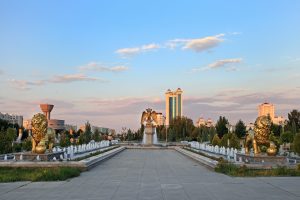The world is not short of European countries espousing commitments to ethical foreign policy and moral conscience. But many of these same countries’ engagement with Turkmenistan reveals such statements to be little more than a performative farce.
Unfortunately, governments escape accountability because of a general lack of interest among Western publics in the often-grim realities of life in Turkmenistan and because institutions like the mass media, which would normally demand answers, are failing to do so. This leaves the people of Turkmenistan doubly forgotten.
Across non-specialist Western media outlets, Turkmenistan’s President Gurbanguly Berdimuhamedov is often characterized as a “wacky” dictator with a talent for staging bizarre photo-ops. Since 2016, the Turkmenistan section on The Guardian’s website has been littered with videos of the “gun-toting” president performing rap songs with his grandson, erecting golden statues of his favourite dog breed, and hitting holes-in-one. Likewise, almost a third of Der Spiegel’s (admittedly limited) articles on the country focus on Berdimuhamedov’s infatuation with world records and Jennifer Lopez’s 2013 birthday serenade for the president.
Further propagating Berdimuhamedov’s stagecraft for comedic value, a simple search of “Turkmenistan” on YouTube yields videos such as “10 wacky things about Turkmenistan,” as well as a segment with over 10 million views from American primetime television program “Last Week Tonight” focusing on the Turkmen president’s “strange obsessions.” The top three most watched YouTube videos on Turkmenistan — with combined viewing figures of 16 million — all follow a similar pattern, privileging the eccentric exterior of Berdimuhamedov over investigating the dark interior of a deeply authoritarian society.
Freedom House’s annual report for 2020 describes Turkmenistan as “a repressive authoritarian state where political rights and civil liberties are almost completely denied,” scoring the country a lamentable 2 out of 100 in its Freedom Score. To place this in context, North Korea scored 3 out of the 100 available points in the same rankings.
This will not surprise anyone with more than a passing knowledge of the country, where there is no media freedom to speak of and access to information is tightly controlled by the government. The state brutally punishes unauthorized expressions of religion or of political views. Torture, mistreatment, and the imprisonment of political opponents and dissidents are systemic.
Despite these gruesome realities, the same Western countries that champion the core values of liberalism on the international stage – vaunting commitments to democracy and freedom of expression – continue to engage in active trade relationships with Turkmenistan’s authoritarian regime. In Europe, the U.K., Italy, and Germany have been the most forthright.
Keen to explore new trade opportunities with one of the world’s most repressive regimes, Germany has hosted Turkmen-German business forums in Berlin, providing a platform for entrepreneurs to seek out new means of investment. Italy boasts the largest trade relationship with Turkmenistan of any European country with bilateral trade value peaking at 605 million euros in 2016. Attempts to maintain this fruitful trade relationship have continued, with the first Turkmen-Italian business directory released in 2020 to encourage further investment.
More ominously, between 2007 and 2017, Italy emerged as the EU major supplier of weapons to Turkmenistan, with 76 percent of the total value of weapons over this period – 257 million out of a total 340 million euros – coming from Italy.
Keen to keep pace, in February of this year the U.K. sent Baroness Nicholson of Winterbourne, the prime minister’s trade envoy, to meet representatives from Turkmenistan’s Foreign Ministry and a host of prominent business entities to discuss the future of “new opportunities” between the two countries. Absurdly, this was framed as part of the U.K.’s “global Britain” agenda, which ostensibly commits it to being a “global force for good.”
Such claims appear even more ludicrous in the context of the U.K.’s willingness to sell arms and technology to Turkmenistan. In 2017, the number of arms export licenses spiked by 15,000 percent compared to 2016, with 151 military arms exports licenses provided in one year. This was a drastic increase from the 80 licenses given over the entire previous decade.
Significantly, 96 percent of these military arms licenses are for technologies and equipment employing cryptography. According to Human Rights Watch, such technology is being used to specifically monitor and block mobile and satellite communications in Turkmenistan. In doing so, the government “seeks to isolate Turkmen citizens from information and communications that are perceived as sensitive, even mildly critical of the government.”
Consequently, if they are concerned that “democracy is in retreat,” the U.K. and other leading European democracies might want to consider their own retrograde roles in this process, rather than continue to assist Berdimuhamedov in maintaining a vice-like grip over Turkmenistan and its people. Liberal intervention is discredited in many quarters, but what is needed here is a form of liberal abstention toward regimes like Turkmenistan — rather than facilitating repression while everyone is either disinterested or distracted by the latest wacky photo-op.

































